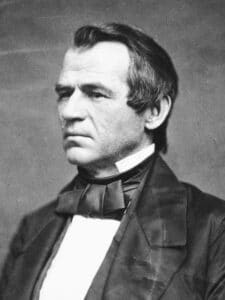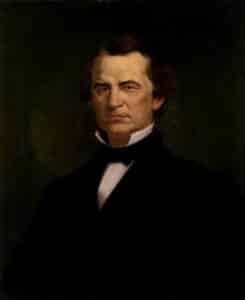Josh Reviews: Andrew Johnson: A Biography by Hans L. Trefousse
Yikes. Seventeenth in my reading of the US Presidents, the 17th US President is a doozy, and not in the good way. The single greatest question I had in this book is why, Lincoln, why did you let this guy become your VP?! That’s not a totally fair question, of course. I don’t think Lincoln or the Union party really considered the issue of Johnson ascending to the presidency. But following the incredible president and man that Lincoln was, and his consummate political skill, we have Johnson, who was an arrogant, amateur blowhard by comparison.
Johnson makes for a difficult subject, and the list of his biographies, none of which really met my criteria, shows that his entire life and reputation comes down to that brief period after Lincoln’s assassination until he had essentially burned all goodwill in Congress, ending up the first president to be impeached. It was, however, a critical time in American history. There’s no telling how the country might have been different with a better leader at the helm when the South was briefly and truly contrite and prostrate. Instead Johnson is the most important figure in what built the “Lost Cause” garbage.

Hans Trefousse is an interesting man in himself. Born in Germany in 1921, his family fled the Nazi regime in 1935 for the United States. As a fluent German speaker, he joined the US Army and worked as an intelligence officer during WWII, at one point saving many lives when after an hours-long negotiation he convinced a German commander to surrender instead of fight. He earned a Masters and a Doctorate after the war, and wrote extensively, especially on the Reconstruction era, which includes this biography of Johnson, a biography of Rutherford Hayes, biographies of Thaddeus Stevens, Benjamin Wade, and Benjamin Butler (who was governor of New Orleans after its surrender to the Union) and The Radical Republicans: Lincoln’s Vanguard for Racial Justice. His works helped to recontextualize the whole era. He was a professor for almost five decades.
I do wish we had more of Johnson’s early life – as I have said before, it’s never an accident when someone becomes president, and Johnson was legitimately a unique person in a unique position. He was the only member of congress from any state that seceded that simply refused to secede with his state, instead maintaining his position in congress while making himself practically an outlaw in his own home. His rise to power had a lot to do with that one decision, but he got into that position in the first place, and that mattered. It’s the reason he was chosen as Vice President for the 1864 ticket, to help balance a ticket in an election that lacked the South entirely.

The book itself is readable, well-researched, reasonably detailed, and one of the most unbiased bios I have read. In general I have commented on these biographies that it’s difficult not to make the subject a protagonist, but Trefousse does a remarkable job giving us a man on paper, and refusing either to censor or viciously decry the actions of the man. He does say several times that it is impossible to ignore the fact that Johnson was a particularly disgusting racist (and this after reading bios of Tyler, who had a “slavery ambassador” to England and Franklin Pierce, who almost cheered at Lincoln’s death!). Johnson is particularly awful in his disingenuousness. At one point claiming he would be the black man’s “Moses”, he had the gall to say that the government should offer nothing to freedmen that it had not to the ‘white man’. His actions in 1865 and his undermining of reconstruction can be seen as nothing but damning, something that helped the rise of the KKK, helped to empower former Confederate leaders, and led inevitably to the death and torture of thousands and thousands of human beings over the next century and into the modern era. It’s hard to take his constitutional values all that kindly when faced with the consequences of his actions (which he was proud of).
Let me say again that Trefousse does a heroic job of pulling me back from single-minded, white-hot hate for this dumpster fire of a president. I did get a little lost in the listing of congressional names occasionally, but Trefousse does a good job of showing that despite being awful, the impeachment was mostly a political facade. It’s hard to say exactly why it failed by a single vote – Johnson trading favors with key politicians, the possibility of the radical Ben Wade becoming president, or an actual stand for the president’s innocence. Johnson had so badly miscalculated his political moves up to that point that he could have been voted out simply because of opposition to his administration, and the fact that he was innocent of federal crime doesn’t mean he didn’t kind of deserve to face some consequence for his impolitic behavior.

It’s a tragedy that the only US Senator to refuse to secede with his state was such a bad president and person. Talk about the potential of a man from the south rising for better ideals. Instead, Trefousse says “his boost to Southern conservatives by undermining Reconstruction was his legacy to the nation, one that would trouble the country for generations to come.” Indeed – a legacy that we still pay for today. The fact that the more radical visions for Reconstruction would have had disastrous results is really beside the point – a strong president would have moderated those feelings while still providing an effective plan for readmitting states who were effectively responsible for the deaths of 600,000 Americans. Instead, Johnson chose his own path, with essentially no winners except leaders of the secession.
It is unfortunate that Johnson was the man to follow Lincoln. Trefousse mentions in his conclusion that historical judgments are rarely fixed in place, and that Johnson’s memory has waxed and waned some, but from the distance we now have, it is hard for a modern audience to 1) stomach the man’s views or 2) buy his (often racist) excuses. This book, though, is a good read for those who can handle it, and it certainly gives us an image of the man – if not a very flattering one. With the strength of hindsight, I can firmly say that the people have not vindicated his actions as president, no matter how much he thought they would.

